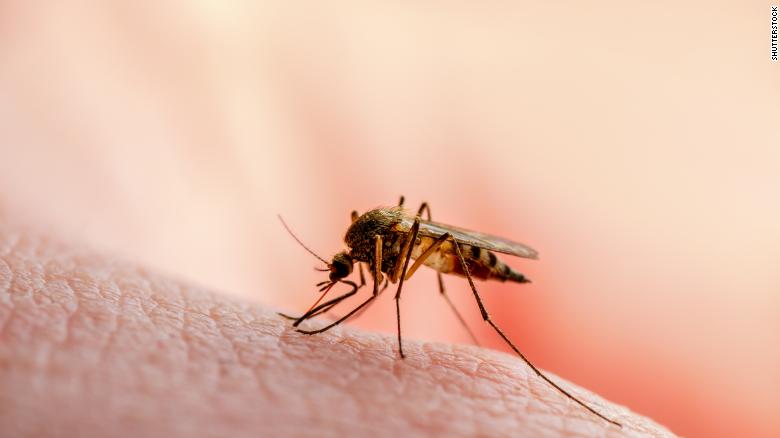- Click to share on Facebook (Opens in a new window)
- Click to share on Twitter (Opens in a new window)
- Click to share on LinkedIn (Opens in a new window)
- Click to email a friend (Opens in a new window)
This is how the invading giant hornets kill bees 2:55
(CNN) - A "killer hornet" has apparently invaded the United States. However, you should not fear that insect.
It's called an Asian giant hornet, for starters, and only two have been seen in the U.S. USA, both in Washington state. It can attack honey bees, but bees are much more susceptible to other viruses, mites, and a waning habitat. And although their stings are capable of killing people, that is relatively rare.
The insect you have to fear is probably buzzing nearby, and it likes blood: yours.
"If there are animals that deserve more fear, it's mosquitoes," said Lawrence Reeves, a research assistant scientist at the University of Florida's Laboratory of Medical Entomology of Florida.
Mosquitoes are one of the world's most dangerous animals for humans due to the diseases they transmit, said Reeves, an entomologist whose research focuses on mosquitoes and the pathogens they transmit.
How to stop the invading giant hornets 1:45Mosquito-borne diseases kill more than 700,000 people a year
The Asian giant hornet is believed to kill 50 people a year worldwide, primarily due to allergic reactions or multiple stings.
According to the World Health Organization, more than 700,000 people die each year from mosquito-borne diseases.
While those diseases are quite rare in the United States, the risk is not zero.
"In the United States, I would expect to become infected with a mosquito-borne virus as common as winning the lottery," Reeves said. That said, there are always lottery winners. "
In the United States, common mosquito-borne illnesses include West Nile virus and the dog's heartworm.
But in 2019 there was a significant outbreak of eastern equine encephalitis, or EEE. According to the Centers for Disease Control and Prevention, that mosquito-borne disease infected at least 38 people in the Northeast and Midwest of the United States. and killed 15 of them.
EEE is quite serious: one in three people infected with the disease dies, and those who survive often face neurological damage.
Mosquitoes bite when they are hungry. Asian giant hornets sting when afraid
Like wasps and bees, the Asian giant hornet probably doesn't sting people unless it feels threatened. If you were to leave him alone, it probably wouldn't bother you, Reeves said ... so crush them at your own risk.
However, mosquitoes bite because they are hungry. Female mosquitoes rely on blood to carry the protein they need to make their eggs (oh yes, baby mosquitoes, the last thing we need!).
read. Killer giant hornets ?! Twitter is going crazy over bugs first seen in the US
There are 3,000 species of mosquitoes and counting
Reeves said he is surprised that Asian giant hornets have garnered so much attention. Entomologists identify new species of invasive mosquitoes each year, sometimes several times a year, in Florida.
There are more than 3,000 species of mosquitoes worldwide, and different species carry different viruses.
The risk of getting a mosquito-borne disease is related to where you live, Reeves said: If you live in the humid, tropical Florida Keys, the southernmost point in the U.S., then your risk is much higher than that of someone who lives in urban Manhattan.
But mosquitoes can live almost anywhere in the US, as long as there's standing water and some heat. The Asian giant hornet, again, has only been seen in Washington state. It is more frequent in the tropical areas of East Asia.
There are other species in the U.S. scarier than the 'killer hornets'
Mosquitoes are not the only ones. There are other enemies more formidable and painful than the Asian giant hornets.
For example, the tarantula hawk wasp. Even larger than the giant 5cm hornet, this wasp's sting ranks second on the Schmidt pain scale, a system devised by entomologist Justin Schmidt. He described the pain as “blinding, fierce, surprisingly electric. Like dropping a hair dryer in your bubble bath. "
Oh.
They live in much of the southern and western United States, Reeves said, and most people don't even know they exist, perhaps because they are missing the word "killer" in the name.
MORE: Coronavirus and Killer Hornets: Another Example of How The Simpsons Predicted the Future?
Avoid bites of any of the species
Contracting a mosquito-borne disease is a lottery that no one wants to win.
To avoid them, learn about the mosquitoes that populate your area.
Cover up when you're outdoors or use insect repellent that contains the powerful ingredient DEET and make sure your pets are up to date with their vaccinations; mosquitoes could also bite them.
And think twice before killing a colony of native wasps, Reeves said. Many species get rid of invasive pests and pollinate plants, and getting rid of them can upset the ecological balance.
If you happen to come across an Asian giant hornet, leave it alone and notify your state's wildlife department. They can handle it.
- Polillas gitanas: el estado de Washington ahora tiene otro bicho por el cual preocuparse (tras los avispones gigantes)
HornetsMosquitoes

